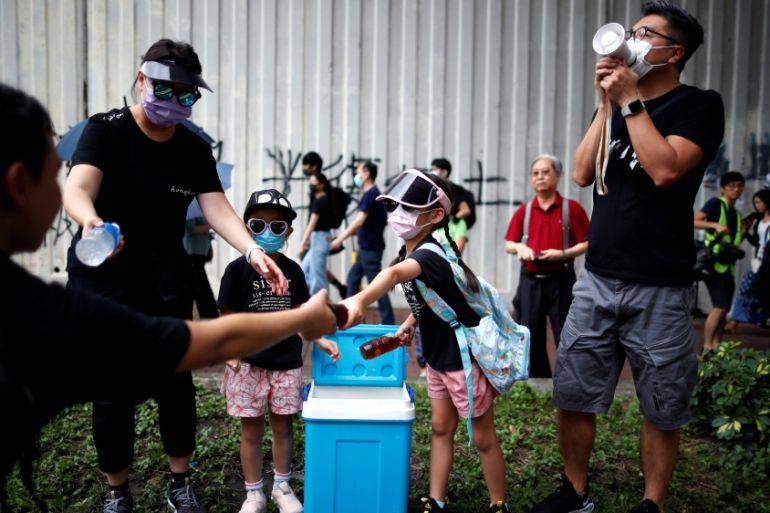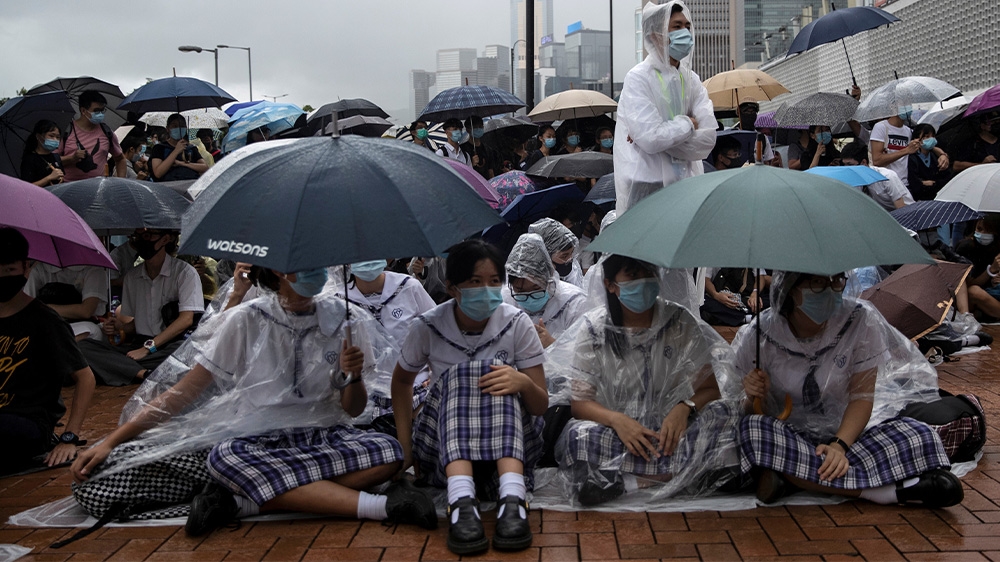Family politics: How Hong Kong protests affect the home dynamic
While some parents buy protective gear for children attending rallies, others refuse to accept their participation.

Hong Kong, China – Kitty Ho, like most mothers, always worries about her two daughters getting into trouble.
Samantha, 18, and 21-year-old Elmo are among the tens of thousands of young people who have thrown themselves into the protest movement to hold the city’s top leaders – and their bosses in Beijing – accountable for pushing for controversial extradition legislation.
Keep reading
list of 4 itemsHong Kong’s new security law comes into force amid human rights concerns
Hong Kong passes tough new national security law
What is Article 23, Hong Kong’s new draconian national security law?
In recent weeks, they have braved volleys of tear gas and rubber bullets.
And on Monday, as classes resumed after the summer break, thousands of students went on strike, boycotting the first day of school.
“Whenever I watch the clashes going on on TV I’m worried sick, even though I know why they need to be out there. I feel so conflicted,” said Ho, as she removed her glasses to wipe her tears.
“But I fear what can happen to them if they get arrested.”
Elmo Ho, the elder daughter, counts herself lucky.
“My parents don’t ask what I do when I take to the streets; that’s the most I can ask,” she said. “Some of my friends have had to run away from their home because they just can’t stand their parents.”
Through grit and “guanxi”, or connections, Kitty Ho rose from factory girl to administrator.
With her husband, she built a comfortable middle-class life for her daughters.
“In the old days, we were taught to be docile and obedient: I was like one among a herd of sheep,” said Ho.
But her daughters’ activism has inspired her, she said.
“I’m still scared but my family has emboldened me.”
Other protesters, however, have reported being financially cut off by their parents, complaining that this made it difficult to purchase expensive industry-grade face masks to protect themselves during clashes.
In the worst case, there was one reported suicide of a young protester whose relatives apparently held different views.
In Hong Kong families, the most consistent faultline is age, and the generation gap in some units is significant.
For young people, the demonstrations are seen as the centre of their fight for a better future.
Those at the forefront of the protest movement are mostly 40 and younger, and some people in an older age bracket oppose any action they deem as rocking the boat.
In the old days, we were taught to be docile and obedient: I was like one among a herd of sheep.
A former British colony, Hong Kong was returned to China in 1997 under the “one country, two systems” framework, and the Hong Kong Basic Law came into effect. This ensured people rights and freedoms largely absent in mainland China. But this 50-year agreement comes with an expiry date of June 30, 2047.
As Beijing was perceived to have interfered in the territory and stalled free and fair elections, younger generations especially were beset by a sense of doom and gloom.
An extradition bill that the Chinese government had proposed was at the centre of the movement, but protesters’ demands have now broadened. The extradition bill would allow any Hong Kong resident to be sent for trial in mainland China courts, where the right to a fair trial cannot be guaranteed.
To some, the bill revealed the weakness of Hong Kong’s top leaders and they vowed to “retake” the city.
The political awakening of the younger generations also parallels Hong Kong’s transformation from a colony for 150 years to a semi-autonomous region.
“The older people came of age at a different time than the younger generation. They were colonial subjects, not citizens,” said Stephen Chiu, a sociologist at the Education University of Hong Kong who has researched the city’s youth and social movements.
“The process of building up our citizens only started after the handover.”
Of the 7.4 million people in Hong Kong, nearly half of them emigrated here.
Most arrived during the Japanese invasion of China during WWII, the civil war and decades of political persecution that followed.
Their “refugee” backgrounds instilled a survival mentality – for many, politics only spelled woes.
For instance, in the 1980s, only a small group of intellectual elites were preoccupied with electoral reforms.
Daniel Chan, 58, hopes his three children are just going through a phase – even though he sees a bit of himself in them.
In 1989, Chan joined the rally against Beijing imposing martial law, which set the stage for the Tiananmen crackdown.
But since then, he has come to appreciate how stability, even at the cost of bloodshed, supports China’s prosperity.
Having risen through the ranks at a mainland Chinese-owned securities company to become managing director, Chan said he has first-hand knowledge on how the “regime” works and worries about the risks his children might face by going up against it.
“I keep reminding them Hong Kongers can’t overthrow the regime,” said Chan. “I fear they’d become cannon fodder.”
These days, Chan suffers silent treatment from the rest of his immediate family.
There is a no politics at the dinner table rule, although he admits he is often is the one to break the gag order by ironically applauding their arrests.
“I do try to rub it in, though I know I can’t change them a bit,” said Chan.
Jan Chan, his 28-year-old middle child, said: “We realised something was awry with Dad over the years. This time around, our conflict has sharpened, especially now that we’re now grown-ups.”
Chan’s wife, Katy Fok, shares her children’s politics, and was baffled by her husband’s change of heart.
“I can’t see a way out,” said Fok, adding her husband and children did at least agree on one thing recently in a WhatsApp group – that family should transcend politics.
Even though they don’t listen to him, Chan said he would do anything to help his children out of trouble.
“This storm,” he said hopefully, “will come to pass.”
